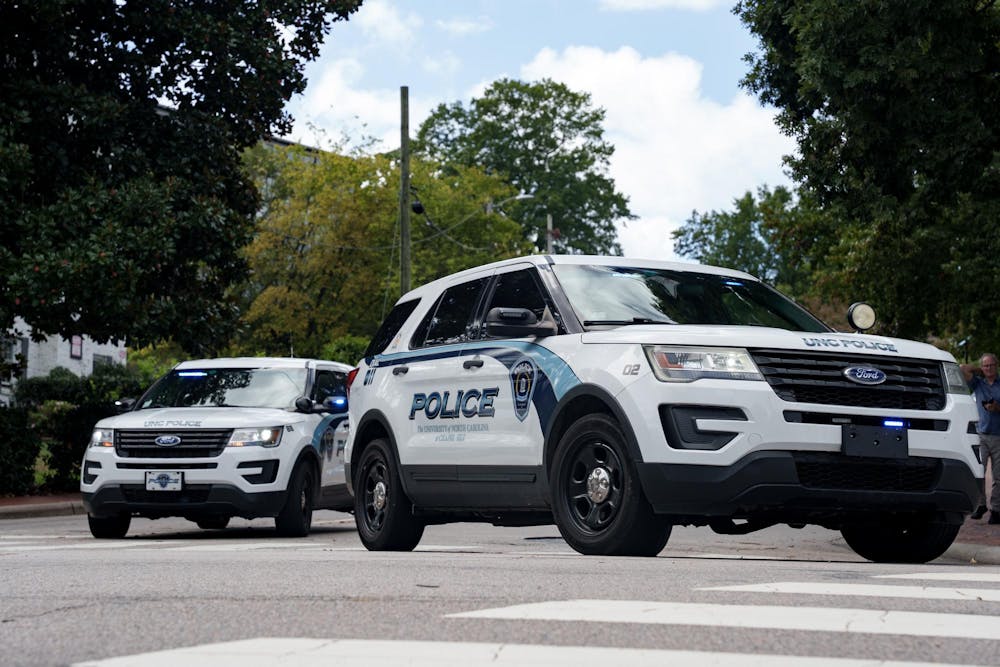“Police are really the only part of our government, setting the Armed Forces aside, allowed to to use force, and it's of necessity,” Welty said. “Their job requires them to interact with people who are noncompliant, who are violating rules and norms and laws. Those people can't always be talked into doing the right thing, so sometimes it's necessary to use force.”
Welty cited a number of constitutional norms and state legal guidance, that limit the amount of force allowed by officers. According to the department’s policy, UNC Police officers are required to consider proportionality when using force.
“UNC-CH police officers and security non-sworn officers must use De-escalation techniques to prevent or reduce the need for Force when the officer or non-sworn security officer Reasonably Believes it is safe and feasible to do so based on the totality of circumstances,” the policy reads.
The policy also states that officers are required to report their use of force if they remove their weapon from their holster, use a weapon or use any weaponless techniques that exceed the mere touching of the subject in order to handcuff.
The number of reported arrests by UNC Police went from over 200 in 2013 to just over 60 this past year. Welty said the increase in reported use-of-force in arrest in the last 10 years made sense considering the decrease in arrests.
“That seems to be driven not so much by more uses of force, but by fewer arrests,” Welty said. “If you think of incidents in which officers use force as likely to be more serious incidents involving more serious problems with people who are more noncompliant.”
Samuel Scarborough, a UNC sophomore and activist with the Southern Student Action Coalition, said it was difficult to draw conclusions from the data. Drawing on his experiences with policing campus activism, he wondered if the changes represented a response to increased student organizing and changed policing tactics.
“Maybe less arrests," he said. "Because students have kind of caught wind that nothing really comes to the arrests, and more violent arrests, because it gives students a more visible demonstration of force that comes as a consequence for standing for justice or trying to make specific demands that go against the status quo.”
Transparency
Along with the statistics, the use of force analysis documents also provide some basic information on the types of incidents that occurred, and possible changes in the department’s practices in response to those incidents.
In last year’s analysis for example, the document states that minorities made up a quarter of the use of force incidents in the calendar year, while they accounted for 75% of the use of force incidents in 2022.
The Daily Tar Heel requested the documents from the University Public Records Office in the beginning of July 2024, with the request initially being denied later that month. After asking for the documents again through emails, the University provided the use of force analyses for 2019-23 on July 28, and claimed no such report existed for 2022. The 2022 report was provided by UNC Media Relations on Sept. 16.
To get the day's news and headlines in your inbox each morning, sign up for our email newsletters.
Scarborough said he thinks UNC Police's hesitancy to share information was representative of a broader trend he has observed at the University.
“There's a whole lot of very recent instances of a lack of transparency,” he said. “Whether it was the installation of Roberts, whether it was the creation of the School of Civic Life, whether it was the firing of Larry Chavis, whether it's this example of policing that shows that the University is not very much interested in being transparent with its internal workings, particularly in the higher levels of administration.”
Reports detailing specific use of force incidents are not subject to public records law in the state of North Carolina, but Meier said other information should still be accessible to the public. He said transparency on behalf of departments is helpful to policing, even outside of the context of a college campus.
“I think body cams are a good example,” Meier said. “For a long time, law enforcement agencies resisted body cams. Now, almost universally, law enforcement body cams have shown people that policing is not what they think. It has turned out to be a net positive.”
UNC Police denied numerous requests for an interview.
CORRECTION: A previous version of this article attributed the Media Relations statement to UNC Police, when it was a statement directly from Media Relations. The original article also stated Media Relations said they could not provide further information on use of force policy, but they did answer two specific questions about the use of force reports.
@_aishabee_
enterprise@dailytarheel.com
Aisha BaiocchiAisha Baiocchi is the 2024-25 special projects editor. She previously served as the 2023-24 enterprise managing editor and a senior writer on the University desk.




